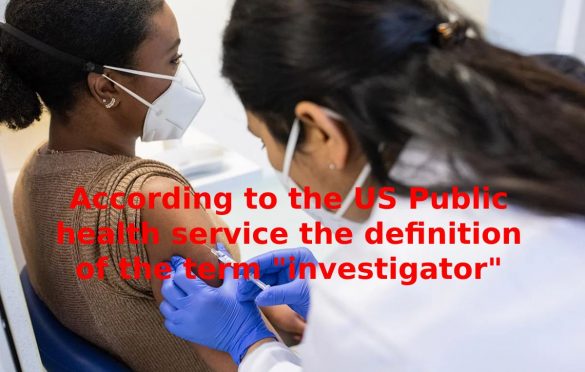According to the U.S. Public health service, the definition of the term “investigator”:

Table of Contents
The promotion of research in public health: According to the U.S. Public health service, the definition of the term “investigator”:
According to the US Public health service the definition of the term “investigator” – The main objective of public health research is to investigate, analyze and explain the distribution of the health status of populations, the factors that determine it, and the socially organized responses to deal with health problems in collective terms. Therefore, its purpose is to generate the necessary knowledge to understand the causes and factors that influence health conditions from a population perspective and evaluate and explain the effect that different policies, interventions, and organization mechanisms exert on said conditions: systems and the provision of health services.
By its very nature, research in public health unfolds in a terrain of actual and potential conflicts that have been the object of analysis and reflection. Reconciling the value of excellence demanded by the scientific community and relevance regarding the needs and resolution of health problems required by decision-makers is one of the conflicts that managers and administrators of scientific activity in the health field must face most frequently.
Mechanisms To Guide Scientific Production Based On Population Health Needs – According to the US Public health service the definition of the term “investigator”
The alternatives proposed in Latin America to face the challenges posed by the pertinence and relevance of scientific production were based on the definition of reference frameworks and research priorities based on economic and social development plans and programs. This approach to science planning, which had its peak in the 1970s under the leadership of the National Councils of Science and Technology, did not achieve the stated institutional articulation between scientific research and the production of goods and services for science. In the health field, several evaluative reports identified and documented. The growing gap between health needs and investment in problem-oriented research in developing countries.
Indicators of scientific production on health in Latin America during the 1970s and 1980s show a significant improvement. And also, in said production’s quality (excellence), but not in its relevance to health needs. The increase in articles based on clinical and basic research consistently outpaced the rise in the number of articles published on public health research. Although there was a slight surge in the fraction occupied by scientific production in public health in the eighties, this increase did not represent an actual change in the trends observed in scientific production in health in the countries of Latin America.
Research Competitions: According to the US Public health service the definition of the term “investigator”

Several mechanisms induce the offer of researchers, among them, research calls or competitions. Which national and international funding agencies the most frequently use. The contests are called to the scientific community to propose research projects. Which are based on the topics on the agenda and following specific terms of reference and requirements.
These contests represent instruments that mobilize the ability to respond, through research. To the demand for pertinent or applicable knowledge to solve problems. The public tenders announced by the National Council of Science and Technology (CONICIT) of Venezuela in the Agenda “Health of the Borders” have been among the specific mechanisms that facilitate the search for a balance between excellence and relevance.
Brazil, Mexico, and Costa Rica science and technology councils have followed similar induction processes. Financial and development cooperation agencies have also used this mechanism to promote. And finance public health research at the international level.
In summary, the so-called research competitions have been one of the induction strategies used most frequently in the 1990s by national. And international organizations that finance health research in Latin America. However, there is not adequate evidence to make it possible to reach conclusions about the impact. These strategies on excellent scientific production. There is no doubt that the contests have mobilized and oriented the offer of the scientific community. And the resources allocated to research towards specific topics of interest to public health. And to new areas that require more excellent knowledge. At the same time, they have stimulated creativity,
Competitions For Research Projects –

The research project competitions have been a variant of the competitors described above. The selection is based on the pertinence and relevance of the proposed topics. However, the project constitutes an instrument that strengthens research capacities and articulation with the levels of health services. Moreover, this strategy promoted and implemented with considerable success in Latin America and other parts of the world. By the Unique Program for Exploration in Tropical Illnesses (TDR) of the World Wellbeing Association (WHO).
Moreover, its support for the production of knowledge of excellence through direct technical advice. In the execution and publication of its results added to the training of researchers, investment in technological infrastructure for research. And also, the incorporation of research results into tropical disease control and prevention programs. This strategy has also facilitated collaboration between countries. It has created, wherever TDR has been present, a scientific community with significant influence. In the decision-making process of programs to control tropical diseases.


